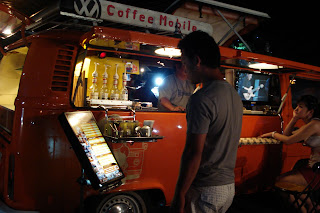“Welcome to “Yourhouse Guesthouse”! Take off your shoes and treat this as your own house as this is no longer my house” was what greeted us as we arrived at our destination in Chiang Mai. “Yourhouse” guesthouse was where we would be spending our nights and whatever free time we had and because of Aunty Sin it was a place we called home for the duration of our stay in Chiang Mai.
Miss Sunanta Thakas, fondly referred to as Aunty by most of us became an integral part of our visit to Chiang Mai as she was more than just our land lady but also a friend and a primary go-to person for anything we could possibly need from breakfast to telling us about places of interest, helping us get tickets and most importantly discounts for almost everything we could want via her impressive connections within Chiang Mai.

Auntie Sin: All smiley at work
Her warm personality and her perpetual smile each time we met her left a definite impression on us, making us wonder what put that smile on her face. So we sat down with her to find out more about her past, her present and her plans for the future.
Coming from a very poor farmer’s family, she was determined to have a better life than if she had remained in her hometown of Lamphun and so she came to Chiang Mai at the age of 20 to help her cousin run the guesthouse. She was involved with almost every aspect of the operations from the restaurant to reception, provided her with enough experience and confidence to open up her very own guesthouse in 1990. Starting small with only 6 rooms, she has gradually expanded to three properties with 44 rooms in total. The guesthouse we are currently occupying is “Yourhouse” 3 the latest addition to her operations, coincidentally the only one belonging entirely to her.
According to Aunty Sin, down the street from where “Yourhouse” guest house is situated used to be quiet and full of greenery but today when we walk down the street we find a number of other guesthouses and eateries, all catering to and competing for the patronage of visitors. The increase in competition together with the political situation earlier in the year resulted in a decrease in the number of foreign tourist to Chiang Mai with room occupation rates dropping to as low as 5%. However, after having experienced the hospitality and her friendliness we have no doubts that once the dust settles around the political situation “Yourhouse” will be back in business and she will hopefully have to fight off the customers wanting a slice of heaven at the hand of Aunty Sin.
The fluency of her English and her occasional use of French words when conversing with us had us wondering what influenced her to learn the languages. She told us about only having had four years of formal education but her interest in the hospitality trade increased her enthusiasm to learn different languages to be able to better communicate with her guests. Her French was further improved when she married a French man in 1989. This marriage however did not last very long as they separated after 8 years because the differences in work ethics which made it difficult to maintain their relationship. This had not stopped Sin from achieving her goals in life. The end of her marriage with her husband who was also a friend and business partner had reinforced her determination to never mix business with pleasure.

Auntie Sin coming to show support for our cultural performances
Attending to the needs of her guests is a full time job which leaves her with very little free time. Aunty Sin however does not see this to be a shortcoming because she enjoys the opportunities available to her to meet new people and considers this aspect to be the highlight of her job. When she does get the opportunity, Sin likes to meet up with her girl friends for a “ladies lunch” where they talk, gossip and catch up with each others lives. Though she spends little time outside her work, there is a connotation that her work is her life, both social and personal.
In terms of her plans for the future, they are not definitive. Realistically, she would love to expand her business to include a Thai cooking school conducted in French and also a swimming pool. Presently however, she lives for the day, as it provides enough fulfillment to better prepare her for the future.
A warm, bubbly and welcoming person, Aunty Sin has definitely made an impression on each of our travelers ensuring that if we were to visit Chiang Mai again a stay at “Yourhouse” would definitely be high on the “to do” list.

In front of Yourhouse, no, Ourhouse.









